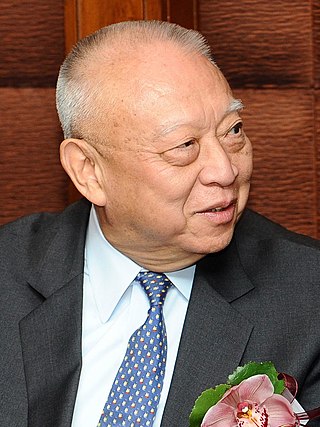| |||||
| Decades: | |||||
|---|---|---|---|---|---|
| See also: | Other events of 1999 History of Hong Kong • Timeline • Years | ||||
Events in the year 1999 in Hong Kong .
| |||||
| Decades: | |||||
|---|---|---|---|---|---|
| See also: | Other events of 1999 History of Hong Kong • Timeline • Years | ||||
Events in the year 1999 in Hong Kong .

Tung Chee-hwa is a Hong Kong businessman and politician who served as the first Chief Executive of Hong Kong between 1997 and 2005, upon the transfer of sovereignty on 1 July. He is currently a vice-chairman of the Chinese People's Political Consultative Conference (CPPCC).

The Basic Law of the Hong Kong Special Administrative Region of the People's Republic of China is a national law of China that serves as the organic law for the Hong Kong Special Administrative Region (HKSAR). Comprising nine chapters, 160 articles and three annexes, the Basic Law was composed to implement Annex I of the 1984 Sino-British Joint Declaration.

Anson Maria Elizabeth Chan Fang On-sang, is a retired Hong Kong politician and civil servant who was the first ethnic Chinese and woman to serve as Chief Secretary, the second-highest position in both the British colonial government and the Hong Kong SAR government under the Chinese sovereignty from 1993 until she retired from the government in 2001, sparking speculations of her growing rift with Chief Executive Tung Chee-hwa.

Right of abode in Hong Kong entitles a person to live and work in the territory without any restrictions or conditions of stay. Someone who has that right is a Hong Kong permanent resident. Foreign nationals may acquire the right of abode after meeting a seven-year residency requirement and are given most rights usually associated with citizenship, including the right to vote in regional elections. However, they are not entitled to hold territorial passports or stand for office in some Legislative Council constituencies, unless they also naturalise as Chinese citizens.

Henry Fok Ying Tung was a Hong Kong businessman. He has ancestral roots in Lianxi Village, Panyu, now part of Guangzhou, Guangdong. Fok was the vice-chairman of the National Committee of the Chinese People's Political Consultative Conference of PRC since March 1993, and was possibly the most powerful Hongkonger in the politics of the People's Republic of China. In 2006, the Forbes Magazine ranked Henry Fok the 7th wealthiest tycoon in Hong Kong and 181st wealthiest tycoon in the world, with an established net worth of $3.7 billion. He died in Beijing on 28 October 2006.

The Grand Bauhinia Medal is the highest award under the Hong Kong honours and awards system; it is to recognise the selected person's lifelong and highly significant contribution to the well-being of Hong Kong. The awardee is entitled to the postnominal letters GBM and the style The Honourable. The award was created in 1997 to replace the British honours system, following the transfer of sovereignty to the People's Republic of China and the establishment of the Hong Kong Special Administrative Region. The list was empty because no one awarded from 2003 to 2004. Bauhinia, Bauhinia blakeana, is the floral emblem of Hong Kong.
The 1996 Hong Kong Chief Executive election was held on 11 December 1996 to select the first Chief Executive (CE) of the Hong Kong Special Administrative Region (HKSAR) which term started from 1 July 1997 after the Chinese resumption of the sovereignty of Hong Kong from the British rule. It was selected by the 400-member Selection Committee installed by the Government of the People's Republic of China (PRC). Tung Chee-hwa, a Shanghai-born Hong Kong businessman who was seen being favoured by Jiang Zemin, General Secretary of the Chinese Communist Party, was the ultimate winner of the election, defeating former Chief Justice Ti-liang Yang and tycoon Peter Woo with a large margin.
The four big families of Hong Kong is a term used to describe the four business families who historically rose to prominence and became influential in Hong Kong. In order of influence, they are Li, Ho, Lo and Hui family.
Orient Overseas (International) Limited (OOIL) is a Hong Kong, China based investment holding company involved in international transportation and logistics, and property investment and property development. It is the parent company of Orient Overseas Container Line (OOCL), one of the world's largest container shipping companies.
Tung Chee-chen, GBS, SBS, JP is a Hong Kong billionaire businessman. He is the chairman and chief executive of shipping company Orient Overseas and a member of the One Country Two Systems Research Institute, a pro-Beijing political thinktank. He is Monaco's honorary consul to Hong Kong.

Office of the Chief Executive (CEO) is one of the government agencies for the Hong Kong Special Administrative Region. It consists of the immediate staff to the Chief Executive of Hong Kong and multiple levels of support staff reporting to the Chief Executive. The current director is Carol Yip, making her the first woman to hold the office.

Director of Immigration v. Chong Fung Yuen was a 2001 case in Hong Kong's Court of Final Appeal. Chief Justice Andrew Li, in the Court's unanimous opinion, affirmed lower court decisions that Chinese citizens born in Hong Kong enjoyed the right of abode regardless of the Hong Kong immigration status of their parents. The case touched on issues of interpretation of the Hong Kong Basic Law, both common law interpretation by courts in Hong Kong as well as interpretation by the Standing Committee of the National People's Congress (NPCSC) of the People's Republic of China. Professor Albert Chen of the University of Hong Kong describes the case as part of a "period of elaboration and consolidation of the regime of rights in the Hong Kong SAR", lasting roughly from 2000 to 2002.
Lau Kong Yung v. Director of Immigration was a 1999 right of abode case in the Hong Kong Court of Final Appeal following closely on the heels of the landmark Ng Ka Ling v. Director of Immigration decision earlier that year. After Ng and the two prior actions in Lau, but before the case came before the CFA, the Standing Committee of the National People's Congress (NPCSC) of the People's Republic of China issued an interpretation of the Basic Law which affected the rights of Lau and his fellow applicants. Lau thus became the first case in which the CFA had to take into account an NPCSC interpretation in applying the Basic Law.
The Hong Kong Special Administrative Region Basic Law Consultative Committee was an official body established in 1985 to canvass views in Hong Kong on the drafts of the Hong Kong Basic Law.

The 1995 Hong Kong Urban Council and Regional Council elections were the municipal elections held on 5 March 1995 for the elected seats of the Urban Council and Regional Council respectively. It was the second of the three-tier elections held in 1995 under Governor Chris Patten's electoral reform, namely the 1994 District Board and 1995 Legislative Council election. The liberal Democratic Party continued its dominance by winning 23 seats in total. Due to the abolishment of the two Councils by Chief Executive Tung Chee-hwa in 1999, this election became the last election.

The Second term of Tung Chee-hwa as Chief Executive of Hong Kong, or Tung administration, officially considered part of "The 2nd term Chief Executive of Hong Kong", relates to the period of governance of Hong Kong since the transfer of sovereignty of Hong Kong, between 1 July 2002 and 12 March 2005 until Tung Chee-hwa resigned from the office and the rest of the term was taken up by former Chief Secretary for Administration Donald Tsang.
The election for the Hong Kong deputies to the 10th National People's Congress (NPC) was held on 3 December 2002. 36 Hong Kong deputies were elected by an electoral college.

Mou Min Kap Sin Fung, also known by its alternative title File Noir, is a 1989 Hong Kong action crime thriller television series produced by TVB and starring David Siu, Kitty Lai, Donnie Yen and Francis Ng. Originally released overseas in September 1988 and aired from 1 to 26 May 1989 on TVB Jade, the series reran on TVB's Network Vision channel from 25 January to 29 February 2016 as a part of the special, Our... Donnie Yen (我們的...甄子丹), that began running on 11 January 2016.
Events in the year 1998 in Hong Kong.

Ng Ka Ling v Director of Immigration was a joint appeal of three cases decided in 1999 by Hong Kong's Court of Final Appeal (CFA). Chief Justice Andrew Li, in the Court's unanimous opinion, held that mainland-born children of Hong Kong permanent residents enjoyed the right of abode, regardless of whether one of their parents have acquired Hong Kong permanent residency at the time of birth of the children.